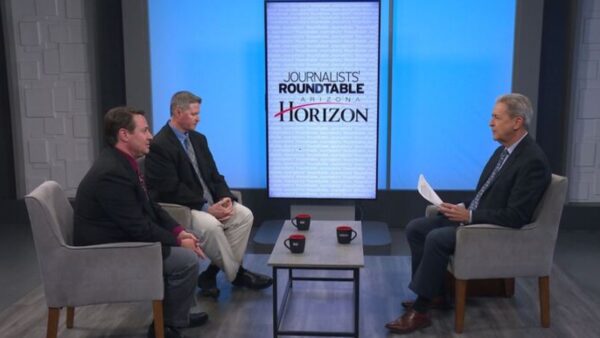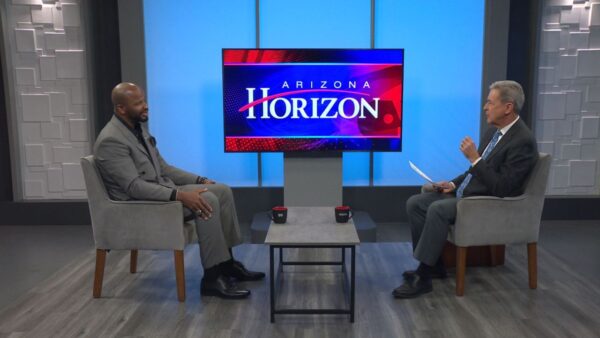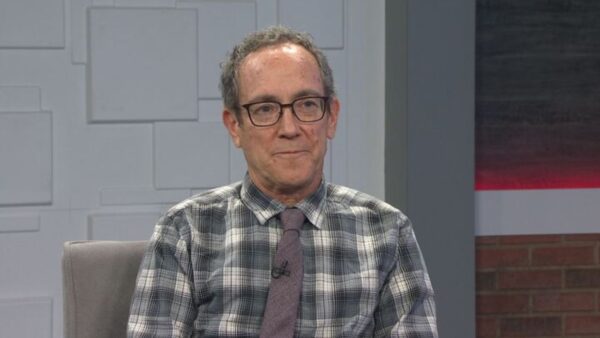While creditors are supporting a bill (HB 2664) moving through the state legislature that deals with credit card debt, others are saying it’s a bad deal for consumers. Hear from attorneys on both sides of the issue.
Ted Simons: If you use a credit card you are required to pay back what you borrow but sometimes people can't or won't pay their debt. Creditors can use litigation to try to collect or they can give up and sell the debt to a debt buyer for a fraction of what they're owed. The debt buyer then tries to collect the debt. House Bill 2664 is an attempt to address the system of debt collection. Supporters see the bill as a way to streamline the process. But opponents say it's an attack on consumer protections. The bill failed in the Senate yesterday but today -- but it was revived by a motion to reconsider. No word when another vote will take place. Here in support of the bill is John Kaites, an attorney who represents the Arizona Creditor Bar Association and opposed to the bill is Veronika Fabian, an attorney who represents consumers in debt collection cases. Good to have you both here. Thanks for joining us. We appreciate it. Did I get that right as far as describing what debt buyers do?
John Kaites: You got it right but those wouldn't be my clients. And I think that sometimes the debt buyer gets used as a red herring in these matters so that you can kind of vilify the issue. This bill only deals with cases 2 in which people do not appear in court. So if you don't pay your credit card bill, if you get sued, if you get served, and you don't appear, all this bill does then is, when you get to -- when the lawyer for the credit card company goes to court, he can get a default judgment because you failed to appear, and he can show your final bill as evidence of what is owed. That's all the bill does.
Ted Simons: Is that all the bill does?
Veronika Fabian: I disagree. There's one provision that deals with default situations but there's also provisions that allow the creditor and debt buyer, the credit under the bill is specifically defined to include debt buyers, can prove the interest rate on the contract by showing a billing statement or terms and conditions. This is not just in default situations. The bill also allows a creditor or debt buyer to show that the consumer accepted the terms of the contract just by the use of the credit card without requiring that the consumer ever saw the terms of the credit card agreement.
Ted Simons: Why not use that final statement as proof, as a contract, if you will, that an agreement was made?
Veronika Fabian: Well, we see many, many mistakes notice final billing statement. For example, I had, once I represented a disabled veteran. He was being sued for credit card debt and the final billing statement showed all these amounts, he allegedly owed and he was like there's no way I owe this much. I went back through all the previous credit card statements and found out that he had been charged thousands of dollars for disability insurance when he was disabled so he did not -- that would never have been useful for him.
Ted Simons: How do you make --
John Kaites: I would never defend a case like that. She's absolutely right. Those people should not be held liable for debts they don't open. It's only a two-page bill. This is not the medical health care bill of 16,000 pages. You can read the two pages and on line 4 it specifically asserts the rights of individual consumers by saying, in no case is a credit card holder liable for any charges or interest that result from the unauthorized use of the credit card. We want, we obviously want to protect legitimate rights.
Ted Simons: But do mistakes happen? And when those mistakes --
John Kaites: Sure.
Ted Simons: Who is responsible?
John Kaites: If a mistake happens, you call your credit card company and they by Federal law have to clear up the mistake. If you sue somebody and they fail to appear, that's the situation we are dealing with in this bill, but if they do appear, it says right in the bill, right here, on -- no, it says right in the bill -- here we go. That if you end up suing and you show up for your contested case, you are perfectly capable of trying a case under current law. So Veronika would be able to show on behalf of her clients and win that case. She would win that case every single time whether this law passed or not.
Ted Simons: What's wrong with that?
Veronika Fabian: Well, first of all, there's already protections. There's already rules of evidence, rules of contract law that are in place. A judge should have the discretion to make a decision whether the evidence that they are providing is sufficient to establish amount of the debt. Just so it's clear, I mean, the plaintiff already gets a lot of benefit when is there's a default situation. The contract is deemed, the breach is deemed credited. All they have to prove under the Arizona rules of evidence is the amount due under the contract. And the judge has been doing, judges want to do justice and they have been making these decisions based on what's competent evidence of the amount due for a long time and the legislature shouldn't be telling judges what is competent evidence.
Ted Simons: Please.
John Kaites: The question comes down to, if somebody charges a lot on their credit card, they don't pay the bills, they get sued, they get served and they don't show up in court, you do waive all those rights. Veronika is right. You waive all those rights because you don't show up. But if you show up here we ensure in here you have all your rights and we enforce them in the legislation.
Ted Simons: What does this bill do?
John Kaites: The problem is there's an inconsistency in the limited jurisdiction courts. These right small claims courts or the justice courts with how the damages have to be proved. If the case in controversy is only $1,000 or $1500, and I have to put on a whole damages case, it could cost me, $3,000, $4,000, $5,000 in a case where the other side didn't show up. This makes it more efficient to collect the debt to the benefit of all credit card holders.
Ted Simons: Does this address inconsistencies as far as judges are concerned?
Veronika Fabian: Well, it -- I don't think that there's that many inconsistencies. I think the rule is pretty clear about what they need to submit. They have to submit an affidavit of someone who has the knowledge of the debt or the custodian of the records of the original debtor. In this case that's the problem with the debt buyers. They don't have a custodian of the original creditors to testify as to the amount due. They can't submit that affidavit. I also want to point out with respect to these default judgments, it's not that everybody gets served with this information and has the opportunity to dispute it. The Arizona rules of civil procedure allows people -- the rule itself allows service not necessarily by handing it to the person but allows you to leave it at the home with someone of suitable age or discretion. There's also alternative servers where people get served through publication or by mailing to the last known address. This particularly can affect military members, who move around a lot. These people aren't always people who get notice of the suit. Their interests should be protected in the default proceedings by the judge who has discretion and legal knowledge to know what's appropriate.
John Kaites: That's the current law. That's nothing in this bill changes how you have to serve somebody. And, in fact, if you have to serve somebody from publication, you have to prove they are avoiding your service. So the bottom line is if people don't pay their bills, and if people don't show up for court, then, the whole system, all of us, have to pay this charge. All of us have to pay this cost. The consumer is the one that ultimately benefits from this bill because of making the legal system more efficient in small claims cases.
Ted Simons: Critics say this allows for, actually allows for forcing repayment of what's already been paid or what may already have been dismissed or forgiven. Thinks a possibility with this bill?
John Kaites: No. We specifically tried -- we specifically say you can't collect those kinds of cases. You have to allow the current Federal law, the current state law, that protects consumers right now is reinforced in language in this bill on page 2.
Ted Simons: You agree that?
Veronika Fabian: I do not agree with that. I believe that this will continue to allow creditors to use the courts as a collection arm. They already have a great deal of power because they are the ones with all the records able to establish their cases quite easily. You know, again, this isn't just about default judgments. Again, there's two provisions of this bill that apply when it's contested action. They can establish their interest rate through a billing statement or terms and conditions without any proof that the consumer ever got it. They can establish the existence of a contract just by the fact that the consumer used the credit card.
John Kaites: Right so you can establish -- you can -- listen to her words. You can establish the existence of the contract because you were out there charging things on your credit card. Of course you can. If I buy a TV at Wal-Mart and put that in my house I have to pay that back. If you don't everybody pays for it in increased costs on their credit card. The people who pay their credit cards are the ones that pay the costs of these collections not happening.
Ted Simons: Bottom line, critics say this benefits collectors, debt buyers, if you will, not consumers. Your response.
John Kaites: I believe that the vast number of consumers, 99% of the consumers want to see this loophole go away because they're the ones that will benefit.
Ted Simons: Bottom line, supporters say this makes the legal system more efficient. Your response.
Veronika Fabian: My response is that supporters want to put their thumb on it easier to make it easier for debt buyers to prove their case, even though they're often mistaken.
Ted Simons: We have to stop it right there. Good discussion.
John Kaites: Thank you very much.
John Kaitis :Attorney of Arizona Creditor Bar Association; Veronika Fabian :Attorney of Consumer Debt Collection




















